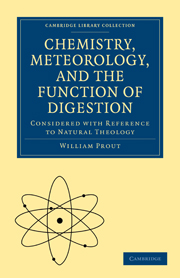Book contents
- Frontmatter
- TO THE READER [FIRST EDITION]
- TO THE READER [SECOND EDITION]
- Contents
- Dedication
- INTRODUCTION
- BOOK I OF CHEMISTRY
- CHAPTER I OF THE MUTUAL OPERATION OF PHYSICAL AGENTS AND OF MATTER, AND OF THE LAWS WHICH THEY OBEY
- CHAPTER II OF THE INERTIA AND ACTIVITY OF MATTER
- CHAPTER III OF MOLECULAR OR POLARIZING FORCES, ETC
- CHAPTER IV OF CHEMICAL ELEMENTARY PRINCIPLES, AND OF THE LAWS OF THEIR COMBINATION
- BOOK II OF METEOROLOGY
- BOOK III OF THE CHEMISTRY OF ORGANIZATION
- APPENDIX
CHAPTER I - OF THE MUTUAL OPERATION OF PHYSICAL AGENTS AND OF MATTER, AND OF THE LAWS WHICH THEY OBEY
Published online by Cambridge University Press: 29 August 2010
- Frontmatter
- TO THE READER [FIRST EDITION]
- TO THE READER [SECOND EDITION]
- Contents
- Dedication
- INTRODUCTION
- BOOK I OF CHEMISTRY
- CHAPTER I OF THE MUTUAL OPERATION OF PHYSICAL AGENTS AND OF MATTER, AND OF THE LAWS WHICH THEY OBEY
- CHAPTER II OF THE INERTIA AND ACTIVITY OF MATTER
- CHAPTER III OF MOLECULAR OR POLARIZING FORCES, ETC
- CHAPTER IV OF CHEMICAL ELEMENTARY PRINCIPLES, AND OF THE LAWS OF THEIR COMBINATION
- BOOK II OF METEOROLOGY
- BOOK III OF THE CHEMISTRY OF ORGANIZATION
- APPENDIX
Summary
“God has been pleased to prescribe limits to his own power, and to work his ends within those limits. The general laws of matter have perhaps the nature of these limits; its inertia, its reaction, the laws which govern the communication of motion, of light, of heat, of magnetism and electricity, and probably of others yet undiscovered. These are general laws, and when a particular purpose is to be effected, it is not by making them wind and bend and yield to the occasion, (for nature with, great steadiness adheres to, and supports them) but it is, as we have seen in the eye, by the interposition of an apparatus corresponding with these laws, and suited to the exigency which results from them, that the purpose is at length attained. As we have said, therefore, God prescribes limits to his power, that he may let in the exercise, and thereby exhibit demonstrations of his wisdom. For then, i. e. such laws and limitations being laid down, it is as though one Being should have fixed certain rules; and, if we may so speak, provided certain materials; and afterwards have committed to another Being, out of these materials, and in subordination to these rules, the task of drawing forth a creation: a supposition which evidently leaves room, and induces indeed a necessity for contrivance.
- Type
- Chapter
- Information
- Chemistry, Meteorology and the Function of Digestion Considered with Reference to Natural Theology , pp. 24 - 26Publisher: Cambridge University PressPrint publication year: 2009First published in: 1834



